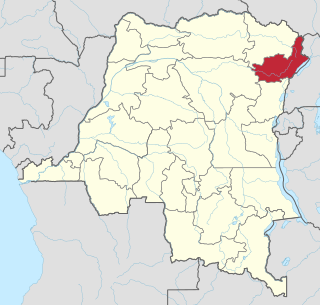
Operation Artemis, formally European Union Force Democratic Republic of the Congo (EUFOR), was a short-term European Union-led UN-authorised military mission to the Democratic Republic of the Congo in 2003, during the Ituri conflict. ARTEMIS is considered the first military operation led by the EU, the first autonomous EU operation, the first rapid response mission of the EU, first operation outside Europe, first operation applying the principle of the framework nation and first example of "relay operation", conducted in cooperation between the EU and the United Nations. The deployment of EUFOR troops quickly decreased the conflict's intensity. It marked the first autonomous EU military mission outside Europe and an important milestone in development of the European Security and Defence Policy.
Congolese history in the 2000s has primarily revolved around the Second Congo War (1998–2003) and the empowerment of a transitional government.

United Nations Security Council Resolution 1906, adopted unanimously on December 23, 2009, after reaffirming previous resolutions on the topic and noting the situation in the Democratic Republic of the Congo, the Council decided to extend the mandate of the United Nations Mission in the Democratic Republic of Congo (MONUC) until 31 May 2010. The resolution therefore allowed 21,000 police and domestic and international troops to remain the country.
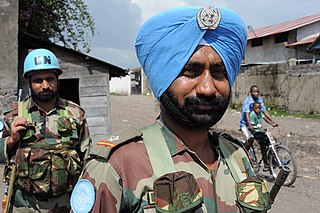
United Nations Security Council Resolution 1925, adopted unanimously on May 28, 2010, after reaffirming previous resolutions on the situation in the Democratic Republic of the Congo, the Council extended the mandate of the United Nations Mission in the Democratic Republic of Congo (MONUC) until June 30, 2010, authorised a withdrawal of 2,000 troops and decided that from July 1, 2010, MONUC would be known as the United Nations Organization Stabilization Mission in the Democratic Republic of the Congo (MONUSCO) with a mandate until June 30, 2011.

United Nations Security Council resolution 1279, adopted unanimously on 30 November 1999, after recalling resolutions 1234 (1999), 1258 (1999) and 1273 (1999) on situation in the Democratic Republic of the Congo, the council established the United Nations Mission in the Democratic Republic of Congo (MONUC) for an initial period until 1 March 2000.

United Nations Security Council resolution 1304, adopted unanimously on 16 June 2000, after recalling resolutions 1234 (1999), 1258 (1999), 1273 (1999), 1279 (1999), 1291 (1999) and 1296 (2000) on situation in the Democratic Republic of the Congo, the Council demanded the immediate withdrawal of Ugandan, Rwandan, Congolese opposition and other armed groups from Kisangani in the Democratic Republic of the Congo.
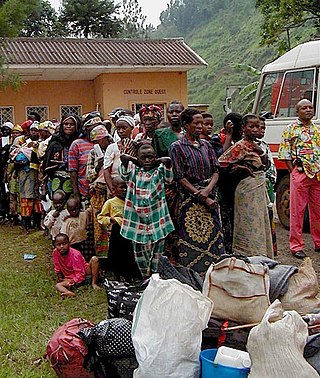
United Nations Security Council resolution 1332, adopted unanimously on 14 December 2000, after recalling resolutions 1234 (1999), 1258 (1999), 1265 (1999), 1273 (1999), 1279 (1999), 1291 (2000), 1296 (2000), 1304 (2000) and 1323 (2000) on situation in the Democratic Republic of the Congo, the Council extended the mandate of the United Nations Mission in the Democratic Republic of Congo (MONUC) until 15 June 2001.

United Nations Security Council resolution 1341, adopted unanimously on 22 February 2001, after recalling resolutions 1234 (1999), 1258 (1999), 1265 (1999), 1273 (1999), 1279 (1999), 1291 (2000), 1296 (2000), 1304 (2000), 1323 (2000) and 1332 (2000) on situation in the Democratic Republic of the Congo, the Council demanded that all parties to the conflict in the country implement disengagement plans and adopt withdrawal plans for foreign troops by 15 May 2001.
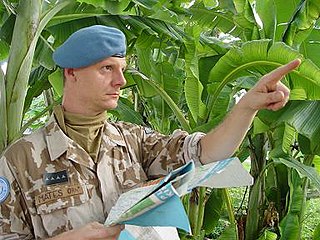
United Nations Security Council resolution 1355, adopted unanimously on 15 June 2001, after recalling resolutions 1234 (1999), 1258 (1999), 1265 (1999), 1273 (1999), 1279 (1999), 1291 (2000), 1296 (2000), 1304 (2000), 1323 (2000), 1332 (2000) and 1341 (2001) on situation in the Democratic Republic of the Congo, the Council extended the mandate of the United Nations Mission in the Democratic Republic of Congo (MONUC) until 15 June 2002 subject to review every four months.

United Nations Security Council resolution 1376, adopted unanimously on 9 November 2001, after recalling all previous resolutions on situation in the Democratic Republic of the Congo, the Council supported the third phase of the deployment of the United Nations Mission in the Democratic Republic of Congo (MONUC).

United Nations Security Council resolution 1399 was adopted unanimously on 19 March 2002. After recalling all previous resolutions on the situation in the Democratic Republic of the Congo, the Council condemned the capture of the town of Moliro and other activities by the rebel Rally for Congolese Democracy (RCD).
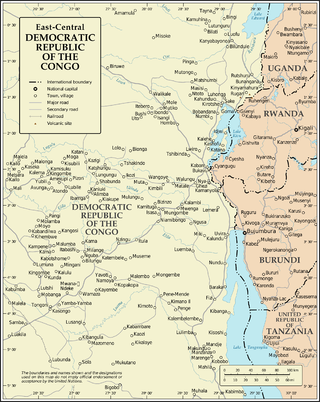
United Nations Security Council Resolution 1417 extended the mandate of the United Nations Organisation Mission in the Democratic Republic of Congo (MONUC) until 30 June 2003. It was unanimously adopted by the United Nations Security Council on 14 June 2002, at its 4,554th meeting. Resolution 1417 was passed after the security council recalled its previous resolutions regarding the matter, particularly Resolution 1355 (2001).

United Nations Security Council resolution 1445 was adopted unanimously on 4 December 2002. After recalling all previous resolutions on situation in the Democratic Republic of the Congo, the council expanded the military component of the United Nations Mission in the Democratic Republic of Congo (MONUC) to a level of 8,700 military personnel–up from 4,250–in two task forces.
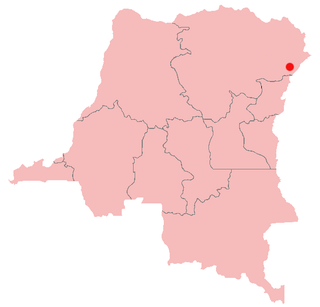
United Nations Security Council Resolution 1484, adopted unanimously on 30 May 2003, after recalling previous resolutions on the situation in the Democratic Republic of the Congo, the Council authorised Operation Artemis in Bunia, the capital of Ituri Province, amid the deteriorating security situation in the area.

United Nations Security Council resolution 1493, adopted unanimously on 28 July 2003, after recalling all resolutions on the situation in the Democratic Republic of the Congo, the council extended the mandate of the United Nations Mission in the Democratic Republic of Congo (MONUC) until 30 July 2004 and raised its troop level from 8,700 to 10,800.

United Nations Security Council resolution 1565, adopted unanimously on 1 October 2004 after recalling all previous resolutions on the situation in the Democratic Republic of the Congo, extended the mandate of the United Nations Mission in the Democratic Republic of Congo (MONUC) until 31 March 2005 and authorised an additional deployment of 5,900 troops and police. It reaffirmed the commitment to respect the “sovereignty, territorial integrity and political independence [sic]” of Congo and States in the region.

United Nations Security Council Resolution 1592, adopted unanimously on 30 March 2005, after recalling all previous resolutions on the situation in the Democratic Republic of the Congo, including Resolution 1565 (2004), the Council extended the mandate of the United Nations Mission in the Democratic Republic of Congo (MONUC) until 1 October 2005.

United Nations Security Council resolution 1596, adopted unanimously on 18 April 2005, after recalling all previous resolutions on the situation in the Democratic Republic of the Congo, including resolutions 1493 (2003), 1533 (2004), 1552 (2004), 1565 (2004) and 1592 (2005), the council expanded the arms embargo to include all recipients of weapons in the country, and imposed a travel ban and asset freeze on those violating the embargo.

United Nations Security Council resolution 1635, adopted unanimously on 28 October 2005, after recalling all previous resolutions on the situation in the Democratic Republic of the Congo, including resolutions 1565 (2004), 1592 (2005), 1596 (2005), 1621 (2005) and 1628 (2005), the Council extended the mandate of the United Nations Mission in the Democratic Republic of Congo (MONUC) until 30 September 2006.

United Nations Security Council Resolution 1649, adopted unanimously on 21 December 2005, after recalling all previous resolutions on the situation in the Democratic Republic of the Congo, including resolutions 1533 (2004), 1565 (2004), 1592 (2005), 1596 (2005) and 1616 (2005), 1621 (2005) and 1628 (2005), the council extended and expanded sanctions against the country until 31 July 2006, and demanded that foreign fighters disarm or face sanctions.

















